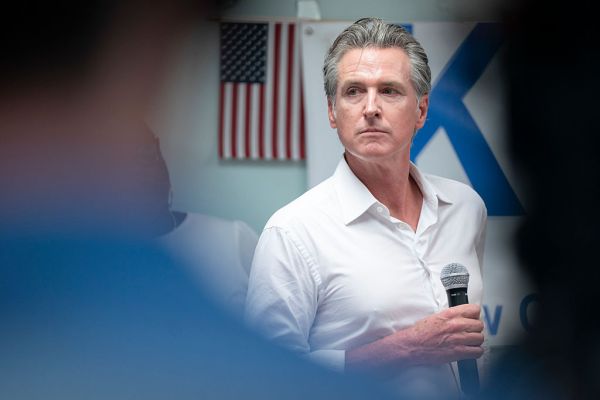Happy Wednesday! Congratulations to Erchana Murray-Bartlett, the 32-year-old Australian runner who recently set a world record by completing 150 marathons in 150 days. “It’s very exhausting, I’ll give you that,” she told reporters earlier this week.
She may also set a world record for the biggest understatement of all time.
Quick Hits: Today’s Top Stories
- Secretary of State Antony Blinken announced Tuesday the Biden administration was imposing visa restrictions on 25 Belarusian officials for their roles in charging opposition leader Sviatlana Tsikhanouskaya and other pro-democracy activists with treason. “These politically motivated trials are the latest examples of the Lukashenka regime’s efforts to intimidate and repress those who seek justice, respect for human rights, and a democratic Belarus,” Blinken said. Tsikhanouskaya is currently exiled in Lithuania.
- Assistant Attorney General Kenneth Polite announced Tuesday the Justice Department is revising its Corporate Enforcement Policy to encourage more transparency and self-policing. In certain circumstances, according to Polite, companies that proactively disclose crimes to the Justice Department upon becoming aware of the misconduct will not face charges—or have their fines greatly reduced—if they cooperate fully with investigators and address the underlying problem.
- The Federal Election Commission decided last week to dismiss a complaint brought by the Republican National Committee and other GOP campaign groups that alleged Gmail’s spam filter constituted “illegal, corporate in-kind contributions to the Biden campaign and Democrat[ic] candidates across the country.” Republicans cited a North Carolina State University study that found GOP campaign emails were sent to spam at a significantly higher rate than Democratic ones, but FEC officials found no evidence any disproportionate results were intentional and held that Google had “credibly supported its claim” that the spam filter exists for commercial purposes. As Sarah noted last year, Republican campaigns have a long history of overusing and sharing email lists, resulting in spam filters being triggered at a higher rate.
- Republican Rep. Jim Banks of Indiana announced Tuesday he is running for the U.S. Senate, looking to fill the seat GOP Sen. Mike Braun will vacate when he retires to run for governor. Banks—a close ally of former President Donald Trump—is the first candidate to jump into the race, but former Gov. Mitch Daniels, Rep. Victoria Spartz, and former Rep. Trey Hollingsworth are also reported to be considering bids.
- Also Tuesday, Ohio state Sen. Matt Dolan announced he is running to unseat Sen. Sherrod Brown, the Democratic incumbent, in 2024. Dolan—a Trump critic—ran in the Republican primary to succeed the retiring Sen. Rob Portman last year, finishing a close third behind now-Sen. JD Vance and former state treasurer Josh Mandel.
Return to Debt Ceiling Purgatory

Welcome, esteemed guests, to this year’s performance of the debt limit dance—a cherished congressional tradition wherein lawmakers wrangle over whether to allow the Treasury to take on enough debt to cover the spending Congress has already approved.
The national debt has ballooned beyond 130 percent of our gross domestic product and is only projected to keep growing. With the Treasury soon to bump up against the $31.4 trillion borrowing limit established during the last performance of this dance in 2021, House Republicans—many of whom approved tax cuts and spending hikes during the Trump era with relatively little fanfare—have rediscovered their fiscal restraint, preemptively declaring any increase to the debt ceiling must be paired with spending cuts. Adopting such a stance was reportedly pivotal in Kevin McCarthy securing enough support to be elected speaker earlier this month.
Established by Congress in 1917 to help the federal government borrow money more easily, the debt ceiling has long proved a convenient political soapbox whenever the time comes to raise it—for both sides of the aisle. In 2006, for example, then-Sen. Barack Obama voted against lifting the debt limit to protest President George W. Bush’s “reckless fiscal policies”—a stance he regretted dearly when faced with his own debt ceiling battle as president a few years later. But in the past, lawmakers tended to resolve these squabbles relatively amicably. The fights were “partisan, but not perilous,” said Laura Blessing, a senior fellow at Georgetown University’s Government Affairs Institute.
But the process has become a higher-octane affair in recent years, with both parties’ tolerance for brinkmanship reaching new levels. The coming debt ceiling negotiation could prove the most treacherous yet.
Worth Your Time
- In a piece for the Financial Times, Patrick McGee takes a deep dive into Apple’s economic entanglement with an increasingly autocratic China. “Over the past decade and a half, Apple has been sending its top product designers and manufacturing design engineers to China, embedding them into suppliers’ facilities for months at a time,” he writes. “These Apple employees have played integral roles co-designing new production processes, overseeing the minutiae of manufacturing until things were up and running, and keeping close tabs on suppliers to ensure compliance. Apple has also spent billions of dollars on custom machinery to build its devices, developing niche expertise that its rivals did not even know about, let alone compete with. It has transformed the company and the country. ‘All the tech competence China has now is not the product of Chinese tech leadership drawing in Apple,’ [Supply chain researcher Kevin] O’Marah says. ‘It’s the product of Apple going in there and building the tech competence.’ These operations played such a salient role that the unassuming character behind them, chief operating officer Tim Cook, would succeed Steve Jobs as CEO in 2011. It was Cook who shifted Apple’s production from the US to China, where he established unparalleled efficiencies that underpinned Apple’s ascent. But this extraordinary success story has also created Apple’s biggest vulnerability: its dependence on a single country, China, which under President Xi Jinping has grown increasingly authoritarian and estranged from the west.”
- As we approach the 30th anniversary of The Simpsons’ legendary Monorail episode, Alan Siegel caught up with Conan O’Brien—a former writer for the show—on what it was like to pitch what is now considered one of the most timeless bits in sitcom history. “[“Marge vs. the Monorail”] warned the world about charismatic men selling foolishly grandiose solutions to problems that don’t need fixing,” Siegel writes for The Ringer. “References to the episode will never cease making O’Brien happy. While browsing the Rose Bowl flea market, his friend once noticed a framed travel poster showcasing Homer and the monorail. ‘It says, “Glides as smoothly as a cloud,’’’ O’Brien says. ‘I was like, “You have to buy that for me.” It wasn’t even that much. That’s hanging in my house, and I kind of smile every time I see it.’ Still, the fact that ‘Marge vs. the Monorail’ is seemingly brought up whenever a grifter dupes the public surprises O’Brien. After all, it was an idea that started very, very small.”
Presented Without Comment
Also Presented Without Comment
Also Also Presented Without Comment
Toeing the Company Line
- Can either side “win” a debt ceiling standoff? Does Joe Biden’s classified documents scandal look better or worse a week later? Was the first Dune movie good? David, Kevin, and Esther tackled all these questions and more on last night’s Dispatch Live (🔒). Members who missed the conversation can catch a rerun—either video or audio-only—by clicking here.
- In this week’s edition of The Sweep (🔒), Sarah takes a look at the recent history of presidential campaign launches and wonders when we’ll see the first challengers to Donald Trump throw their hat in the ring. “Nobody is in any sort of rush, in part because of the shift away from large-dollar donors to small-dollar fundraising,” she writes. “I predict you’ll see some of the smaller teams jump in before spring. … But I bet Pence and Youngkin hang back a while. And DeSantis? He’ll wait as long as he can.”
- Are Republican presidential hopefuls going to learn the lessons of 2016 and aim their fire at Trump early and often, or are they going to engage in another circular firing squad? “The only reason for a Republican hopeful to put their own aspirations aside and back DeSantis in 2024 is because it would be good for the country for the GOP to finally rid itself of Trump,” Nick writes in Tuesday’s Boiling Frogs (🔒). “I doubt a single one will pass on the race for that reason.”
- David’s latest French Press (🔒) points readers to a New York Times piece on the potential drawbacks of corporate diversity trainings. “Big problems aren’t amenable to simple solutions,” David writes. “There isn’t and can’t be a five-point-plan to save faith, to rebuild the family, or to end racial discrimination. The efforts that matter—that really matter—tend to be more individual, more long-term, and more driven by relationships and experience, not by preaching or instruction.”
- A.B. Stoddard returns to The Remnant today to engage in some incredibly rank punditry with Jonah about the dysfunctional state of the United States’ political parties and the prospect of a second Biden term. How concerned should Democrats be about black and Hispanic voters? Will House Republicans cave on the debt limit? And is there any way of excusing Biden’s document blunder?
- On the site today, John Gustavsson breaks down why Turkey is holding up Sweden’s NATO accession, Jonah examines whether some GOP lawmakers’ newfound fiscal hawkishness is genuine or grandstanding, and Kevin shares his thoughts on gas stoves and other household appliances that might be trying to kill you.
Let Us Know
Is the debt ceiling the wrong vehicle through which to have debates about federal spending? Or are some House Republicans correct when they say change can only be achieved when lawmakers’ backs are up against the wall?







Please note that we at The Dispatch hold ourselves, our work, and our commenters to a higher standard than other places on the internet. We welcome comments that foster genuine debate or discussion—including comments critical of us or our work—but responses that include ad hominem attacks on fellow Dispatch members or are intended to stoke fear and anger may be moderated.
With your membership, you only have the ability to comment on The Morning Dispatch articles. Consider upgrading to join the conversation everywhere.